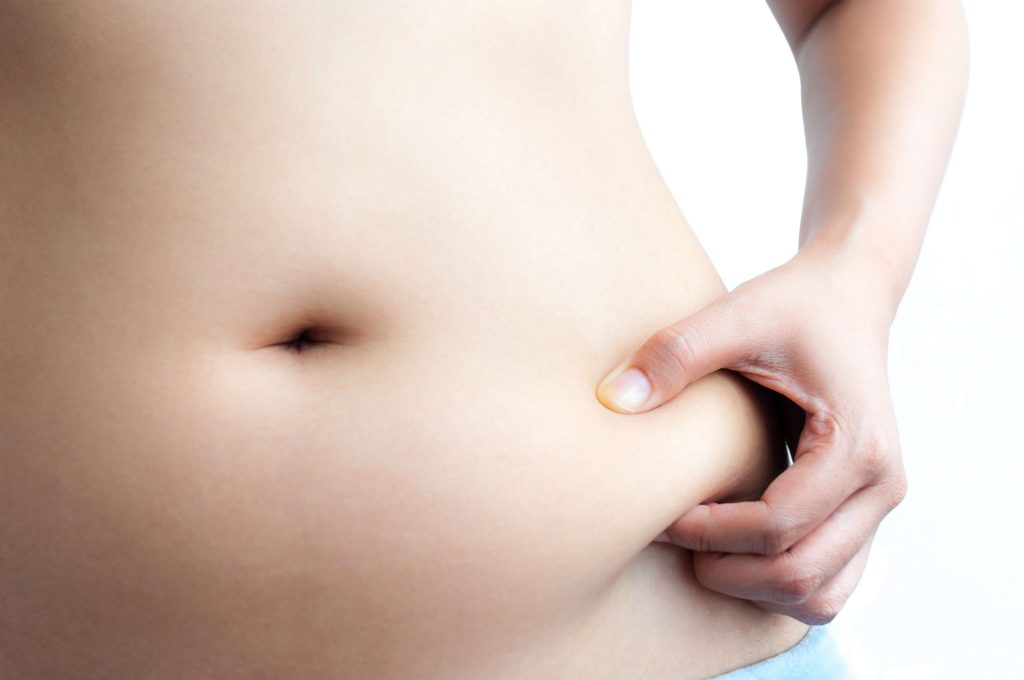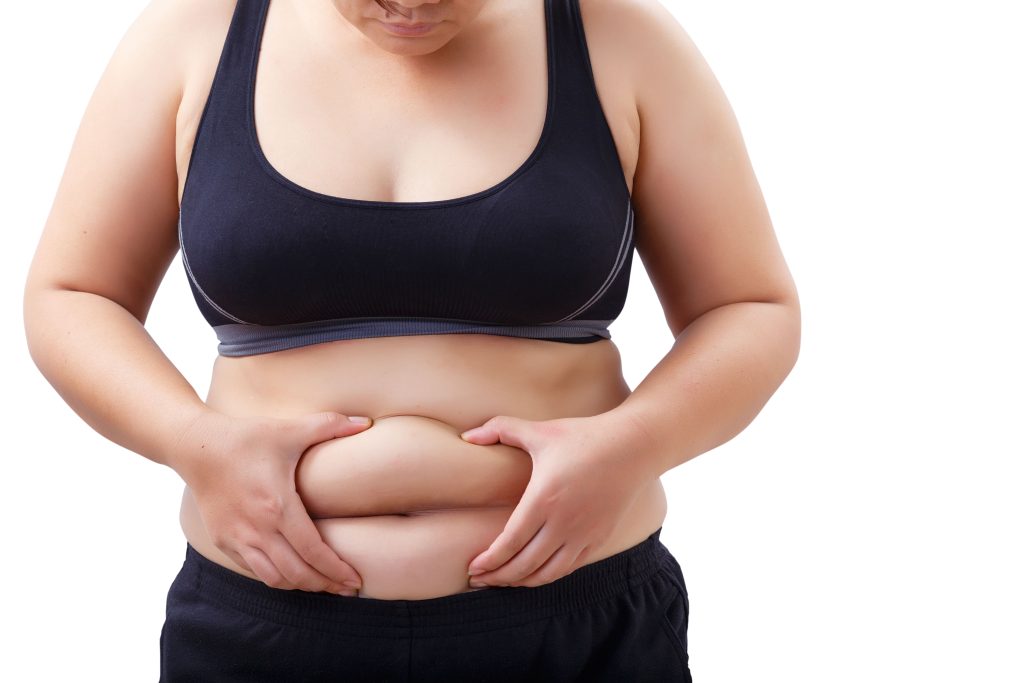
Does Inflammation Cause Weight Gain?


Does Inflammation Cause Weight Gain?
If you’re aspiring to lose weight, you may wonder why you don’t seem to make progress or almost instantly rebound once you hit your goals, especially as you get older. One of the culprits could be inflammation and poor gut health raising your body fat setpoints.
Medicine now considers obesity a disease. Doctors can get board certified in obesity medicine, and treat it with medications and surgeries. In most cases, lifestyle-related inflammation is a key contributor to weight gain, weight loss resistance, and excessive appetite. Conversely, excess body fat, especially visceral fat, can increase inflammation.
In this article, we’ll dive into how inflammation contributes to weight gain, lifestyle factors that cause inflammation, and best ways to address it.

Does Inflammation Cause Weight Gain?
Inflammation is not all bad—it keeps you alive by protecting you from harmful pathogens, damaged cells, and irritants. However, chronic inflammation can be a problem when your body has a prolonged and dysregulated immune response.
Lifestyle-related chronic inflammation affects nearly everyone nowadays because we all have stress, poor diet, and exposure to household chemicals. Animal and human studies suggest that this lifestyle-related inflammation may contribute to obesity, especially in those predisposed to weight gain.
Scientists are not completely sure if inflammation causes obesity or if it is the other way around. These two issues seem to be chicken and egg with each other.
Some signs of inflammation, like high levels of C-reactive protein and other protein markers, are also linked to conditions like diabetes and heart disease. Researchers have also found links between gut health, inflammation, and weight gain – pointing to a potential role between gut health and weight.
Why Do Inflammation and Poor Gut Health Cause Weight Gain?
There are many links between poor gut health, inflammation, and weight gain.
Here, poor gut health doesn’t refer to a specific gut disease, but rather disruptions in the balance of bacteria in the gut or “dysbiosis”. Dysbiosis is very common but may not show any obvious gut symptoms.
Inside the gut, everyone has food at various stages of digestion, along with gut bacteria and their cellular components like lipopolysaccharides (LPS) and lipoteichoic acid (PA).
High-fat and high-sugar meals, dysbiosis, stress, and some medications can temporarily expose your gut content to your immune system or allow them in your bloodstream. This can activate your immune system and increase inflammation in your body.

LPS in low levels in the blood due to leaky gut can cause chronic inflammation throughout the body. This is called “metabolic endotoxemia.” The inflammation can lead to leptin resistance . Leptin is a small protein hormone that regulates hunger and how much energy your body expends.
The chronic inflammation disrupts leptin signaling. This can have several consequences when it comes to body weight:
- Increased appetite: Leptin’s role is to signal to your brain when there is enough energy in reserve. But when your brain becomes resistant to leptin’s signal, it can lead to increased appetite and overeating.
- Slower metabolism: Leptin resistance can also decrease overall energy expenditure since your body sees itself in a state of energy deficiency even though there is plenty of body fat.
- Insulin resistance: Chronic inflammation and changes in metabolism linked to leptin resistance can also contribute to insulin resistance. This is when cells in your body become less responsive to insulin, a hormone that regulates blood sugar levels. When cells resist insulin, your body must produce more insulin to compensate. This can promote fat storage and prevent fat breakdown for energy.
The combination of increased appetite, slower metabolism, and insulin resistance can all lead to weight gain over time. These mechanisms can contribute to developing or worsening other inflammatory conditions in the body.
Does Inflammation Always Cause Weight Gain?
No, everyone is different. Some people are more predisposed than others. You may have friends or family members who lose weight the more stressed, inflamed, or older they get. When it comes to how different bodies respond to inflammation, there can be different patterns or phenotypes in terms of weight changes:
- Weight gain phenotype: Some people tend to gain weight when they experience inflammation. This might be linked to factors like increased appetite, changes in hormone levels, or their body’s response to stress. This inflammation can lead to insulin resistance, which we learned about above, which promotes fat storage, especially around the midsection.
- Weight loss phenotype: Some people can lose weight and become too thin when they get inflamed. This might be because of lower appetite, digestive issues, higher metabolic rate, or their tendency to respond to the inflammation itself. Inflammation can impact how well the body absorbs nutrients from food, leading to weight loss over time.
- Stable weight phenotype: Finally, we have those who might not experience any changes in weight despite having inflammation symptoms. In these cases, factors like genetics, lifestyle habits, and their body’s ability to regulate inflammation might be playing a role in helping maintain their weight.
These different phenotypes tell us that the relationship between inflammation and weight gain can be complex. Everyone’s body is different, and multiple factors can influence how you respond to inflammation and how it can impact your weight.
It is important to consider these important differences. Working with a practitioner who understands individuality can help determine which phenotype you may fit into and help make an action plan specific to you.
How to Get Rid of Inflammation Weight

When looking to get rid of inflammation-related weight gain, it is important to understand the root causes that are involved. To lose weight, you’ll still need to be in a caloric deficit, whether through nutrition, exercise, or other means.
Sometimes, but not always, when inflammation is a big contributor that inhibits metabolism or hormones, removing the root causes of the inflammation can lead to a caloric deficit and significant weight loss.
Initially, it is common to experience big drops in weight during the first week or two when implementing diet and lifestyle changes. This initial drop is often because you are losing water weight, or water retention that tends to come with inflammation. Then, as your body adjusts, if you’re still in a caloric deficit, this weight loss will slow down as you’re now losing mostly fat.
The good news is, that if you continue to stick to these changes, combined with some of the anti-inflammatory strategies below, gradual fat loss will follow. Understanding this progression is key to managing your expectations and staying motivated throughout this journey.
Try an Elimination Diet
For some people, certain foods can trigger inflammatory responses, even if they don’t have obvious food allergies or antibodies. Food sensitivities, despite not always causing allergy symptoms or digestive discomfort, can contribute to low-grade inflammation throughout the body.
By eliminating inflammatory foods – these tend to be processed, high in refined sugar, gluten, dairy, or potential allergens – you can remove inflammation triggers. This can also help improve gut health because you are removing foods that might be irritating the gut lining and causing inflammation.
An elimination diet involves removing certain foods or groups of food from your diet for a set period. This should always be done with a re-introduction phase because elimination diets can lack micronutrients important for overall health.
Work With a Practitioner to Heal Your Gut
As we learned above, there are individual differences between people when it comes to inflammation and weight. This is why it might be a good idea to work with a practitioner to help heal your gut because they can individualize your treatment plan so that it is specific to you and your body.
A qualified naturopathic doctor or functional medicine practitioner can help identify underlying issues, such as leaky gut, dysbiosis, or food sensitivities that might be driving inflammation and weight gain. This can be done through testing, like stool analysis or blood work, with results helping to target interventions that will help.

Add Probiotics
Some recent studies suggest probiotics may help with weight loss by supporting the gut barrier and microbiome.
Most studies of metabolic endotoxemia are done in rodents. When you feed rats and mice high-fat and high-calorie meals, they get metabolic endotoxemia–slightly elevated blood LPS causing metabolic disruption.
In humans, this is equivalent to a high-fat, high-sugar, and excess-calorie meal in a Standard American Diet. Alcohol can also have this effect. When researchers feed the lab rodents probiotics, they tend to mitigate weight gain and blood sugar issues.
Human studies also observe similar benefits, but to a lesser extent than in rats. In a 12-week placebo-controlled trial, of 90 overweight or obese adults, the probiotics Lactobacillus gasseri significantly reduced weight and belly fat.
Some Bifidobacteria strains also seem to have benefits for weight. Animal studies find that these strains can help reduce fat levels in the blood and liver, and others find benefits for weight loss overall. Human studies using Bifidobacterium also find improvements in weight, blood sugar, and cholesterol levels.
Finally, Saccharomyces boulardii strains also have some promising research. In humans, one study found that this specific strain seemed to help reduce body fat and improve how the body responds to insulin in people with obesity.
Some newer, next-generation probiotic strains may be even more effective at improving the gut flora and metabolism. These strains, such as Akkermansia muciniphila, may deliver metabolic benefits through strengthening the gut barrier and gut flora.
Probiotics are not fat burners. They tend to work best in combination with diet and exercise. Overall, we still have a lot to learn when it comes to using probiotics for weight loss. But, it is a promising area. The benefits of probiotics also extend to other areas of health, making them a good choice when thinking about adding something new to your supplement routine!
Best Supplements for Gut Health and Weight Loss: Gut-Friendly Nutrients

Many compounds and nutrients here work by improving your gut flora and promoting healthy inflammatory responses. Of course, supplements are meant to complement a healthy diet and lifestyle, not replace them.
The typical American diet is quite low in the following. This explains why diet and lifestyle-related inflammation are so common. So, it’s worth examining your diet and eating more of these, whether from food or supplements, accordingly.
You should always consult with your health provider before starting anything new, as they can help make sure they are right for you!
Prebiotics: Fibers and Resistant Starch
Hunter-gatherers ate 75 – 100 grams of fiber daily. Now, health guidelines suggest at least 30 grams of fiber daily, but an average American gets only 15 grams. Only 5% of Americans meet this guideline, so it’s time to load up on fibers .
Fibers are indigestible carbohydrates found in foods like vegetables, fruits, whole grains, and beans. Whereas, resistant starches are indigestible starches that can be found in cooked and cooled grains and potatoes, or from chemical processing. Both of these feed your good gut bacteria and help tremendously with inflammation weight.
Eating a high-fiber diet or taking a prebiotic supplement helps with:
- Growing friendly bacteria species and improving your gut flora
- Encouraging them to produce postbiotics that help with your gut barrier, inflammatory response, and metabolism
- Improving overall gut health, digestion, and nutrient absorption
- Slowing down carbohydrate absorption, which helps regulate blood sugar
- Managing appetite by adding bulk to your meals
It may be best if you can load up on as many plates of vegetables as possible. Eat your vegetables even for breakfast and snacks. Also, cook your grains, potatoes, and pasta ahead of time and refrigerate them to increase resistant starch. If you do all of these and still struggle with getting 30 grams a day of fiber or 5 servings daily, then consider adding a prebiotic supplement.
Vitamin D
Vitamin D is not just for bones and calcium. It regulates numerous things in your body, including immune balance, metabolism, hormones, and gut health. Vitamin D is crucial for gut barrier integrity and immune function in the digestive tract.
People who are overweight or obese tend to have lower levels of vitamin D, and higher levels of substances in the body that cause inflammation. Studies combining results from other research find that supplementing with vitamin D can help reduce weight-related inflammation.
Although the clinical studies have been mixed, in our client experience, correcting a vitamin D deficiency often helps with weight and other metabolic issues.

We think vitamin D works by:
- Inhibiting the production of inflammatory molecules in fat cells. In a study of obese people, 6 months of vitamin D supplementation (2000 – 4000 IU/day) seems to lower C-reactive protein.
- Strengthening the gut barrier
- Balancing immune function in the gut
- Improves insulin sensitivity
- Regulates appetite hormones and promotes fat loss, especially if you have low vitamin D levels to begin with.
Clinical studies are also mixed on whether vitamin D improves the gut flora. In our internal testing, we’ve found that vitamin D seems to enhance the growth of good bacteria species, such as lactobacilli.
Therefore, it’s worth testing for and correcting your vitamin D deficiencies accordingly.
Omega-3
Because vegetable oils are the most common type of fats nowadays, most people are consuming too much omega-6 and not enough omega-3 fats. Ideally, you should be consuming up to 4 times omega-6 to omega-3, but most Americans consume 20 times omega-6 to omega-3.
This imbalance can contribute to diet-related inflammation. So, it’s often beneficial to both reduce omega-6 consumption, increase omega-3 consumption, and replace omega-6 with monounsaturated fats.
Omega-3 fatty acids found in fish oil, like EPA and DHA, are precursors to anti-inflammatory molecules in the body. However, omega-3 fats do a lot more than addressing inflammation; they may help with fat loss by:
- Influencing lipid metabolism
- Regulating leptin
- Increasing dopamine, which may boost mood and reduce emotional eating
- Reducing appetite and increasing satiety
- Increasing fat oxidation
- Improve insulin sensitivity
- Strengthening the gut barrier
- Feeding good gut bacteria and encouraging their production of short-chain fatty acids.
You could be eating a lot of fish and seafood, but the farmed ones might be high in omega-6. So, the best way to find out is to test for omega-3 levels in your red blood cells using a test called omega-3 index. Ask your naturopathic doctor or nutritionist about this test.

Polyphenols
Polyphenols are plant compounds that have antioxidant and anti-inflammatory properties. So far, researchers have identified over 8,000 types of polyphenols, each having different colors, flavors, and health benefits. Some of them work by:
- Regulating appetite by affecting the release of certain hormones in the body that regulate hunger and fullness (ghrelin and leptin)
- Interacting with receptors in your gut that promote satiety reducing the urge to overeat
- Slowing down some digestive enzymes and fat absorption
- Stimulating fatty acid breakdown into energy
- Inhibiting the formation and growth of new fat cells
- Protecting tissues and organs from high oxidative stress
- Feeding and helping to increase good gut bacteria.
While some polyphenols are available as supplements, it’s best to get as many different polyphenols as possible by eating as varied plant-based foods as possible. You can still eat meat, but it’s beneficial to add as many types of vegetables, fruits, and nuts as practical.
Check Your Environmental Obesogen Exposures
Many common day-to-day chemical exposures are obesogens. They can cause fat gain by increasing inflammation, interfering with hormone functions, or inhibiting metabolism. These chemicals are found in:
- Air pollution
- Paint
- Household mold
- Perfume
- Pesticides, including pesticide residues in food and environment
- Heavy metals
- Chemicals found in plastics, cosmetics, skincare, and household products
For example, Bisphenol A, phthalates, and tributyltin can disrupt how fat cells function and impact metabolism, hunger, and immunity. These chemicals can interfere with hormone receptors and other signaling pathways, impacting how fat cells function and throwing body systems out of whack .
Not everyone exposed to obesogens will get fat because individual response depends on individual tendency and susceptibility. However, these chemicals are not healthy for anyone.
Being mindful of what you are exposed to in your environment can help minimize potential sources of inflammation and obesogens. It may be impossible to avoid them completely these days, but you can reduce your exposure. Taking steps to use cleaner products, improving indoor air quality, and reducing the use of certain plastics can help!
Optimize Your Sleep
One of the best things you can do to keep weight in check is to get proper sleep. Improving sleep can help reduce inflammation levels and the following factors that are linked to obesity.
Helps Manage Appetite
Enough high-quality sleep ensures that hormones involved in appetite control and metabolism stay regulated. This includes leptin, that hormone that signals when you are full – when you don’t get enough sleep, levels of leptin decrease.
There is also more ghrelin, which is that hormone that makes you hungry. This imbalance can set you up to overeat and even contribute to inflammation. Poor sleep also impacts how your body regulates blood sugar. It can lead to insulin resistance and increase inflammation.

Manages Cortisol and Stress Levels
We also know that quality sleep plays an important role in managing stress levels. Chronic stress can trigger inflammatory responses in the body, by impacting those hormones mentioned above, and impact immune function.
We need sleep for our immune system to function properly. Chronic sleep deprivation can disrupt immune cell signaling, increase the number of pro-inflammatory immune cells, and contribute to systemic inflammation.
Improves Gut Health and Healing
Finally, sleep disturbances can negatively impact gut health – changing the balance of gut bacteria and increasing intestinal permeability. This can lead to dysbiosis and whole-body inflammation.
But, by focusing on sleep hygiene practices and making sure you prioritize a healthy amount of shut-eye (8 hours), you can make a real impact.
Exercise
Exercise can be a powerful tool for improving how your body regulates inflammation and tipping hormonal responses towards fat loss. Regular exercise, like aerobic or weight training, can help reduce chronic inflammation, even without causing weight loss . Exercise does this by releasing anti-inflammatory chemicals from muscles, helping get more oxygen into fat tissue, and supporting blood vessels and immune function.
One study looked at the role exercise played in reducing inflammatory proteins called cytokines. They pooled 27 studies, finding that different types of exercise, like endurance or resistance training, can decrease levels of certain inflammatory proteins like CRP, IL-6, and TNF-α in the blood. Some types of training also increased levels of an anti-inflammatory protein called IL-10. Changes in these molecules often matched up with reductions in fat mass.
Exercise can even have positive impacts on your microbiome, helping increase diversity and improving microbiota function.
Conclusion
Inflammation and poor gut health can make it hard to lose weight or increase the risk of weight rebound, but there is a lot you can do to address it naturally. If inflammation is an issue for you and you want to achieve lifelong results, the following evidence-based anti-inflammatory strategies should help:
- Trying an elimination diet
- Working with a naturopathic doctor or functional medicine practitioner to heal your gut, introduce the right probiotics, and strengthen your gut barrier
- Increasing fiber and polyphenols, while correcting deficiencies in vitamin D and omega-3
- Minimizing day-to-day obesogen exposure
- Prioritizing getting the best-quality sleep every night
- Exercising and moving as much as possible throughout the day
References
- Rosen H. Is obesity A disease or A behavior abnormality? Did the AMA get it right? Missouri Medicine. 2014;111(2):104.
- Stone WL, Basit H, Burns B. Pathology, Inflammation. StatPearls Publishing; 2022.
- Pahwa R, Goyal A, Jialal I. Chronic Inflammation. StatPearls Publishing; 2023.
- Mendes de Oliveira E, Silva JC, Ascar TP, et al. Acute inflammation is a predisposing factor for weight gain and insulin resistance. Pharmaceutics. 2022;14(3):623. doi:10.3390/pharmaceutics14030623
- Tuomisto K, Jousilahti P, Havulinna AS, Borodulin K, Männistö S, Salomaa V. Role of inflammation markers in the prediction of weight gain and development of obesity in adults – A prospective study. Metabol Open. 2019;3(100016):100016. doi:10.1016/j.metop.2019.100016
- Cheng Z, Zhang L, Yang L, Chu H. The critical role of gut microbiota in obesity. Front Endocrinol (Lausanne). 2022;13. doi:10.3389/fendo.2022.1025706
- Ghosh SS, Wang J, Yannie PJ, Ghosh S. Intestinal barrier dysfunction, LPS translocation, and disease development. J Endocr Soc. 2020;4(2). doi:10.1210/jendso/bvz039
- Noor J, Chaudhry A, Batool S, Noor R, Fatima G. Exploring the impact of the gut microbiome on obesity and weight loss: A review article. Cureus. 2023;15(6). doi:10.7759/cureus.40948
- Ferreira FG, Reitz LK, Valmorbida A, et al. Metabolically unhealthy and overweight phenotypes are associated with increased levels of inflammatory cytokines: a population-based study. Nutrition. 2022;96(111590):111590. doi:10.1016/j.nut.2022.111590
- Preda A, Carbone F, Tirandi A, Montecucco F, Liberale L. Obesity phenotypes and cardiovascular risk: From pathophysiology to clinical management. Rev Endocr Metab Disord. 2023;24(5):901-919. doi:10.1007/s11154-023-09813-5
- Lanspa M, Kothe B, Pereira MR, Kesselman MM, Petrosky SN. A systematic review of nutritional interventions on key cytokine pathways in rheumatoid arthritis and its implications for comorbid depression: Is a more comprehensive approach required? Cureus. 2022;14(8). doi:10.7759/cureus.28031
- Wilders-Truschnig M, Mangge H, Lieners C, Gruber H, Mayer C, März W. IgG antibodies against food antigens are correlated with inflammation and intima media thickness in obese juveniles. Exp Clin Endocrinol Diabetes. 2007;116(04):241-245. doi:10.1055/s-2007-993165
- Malone JC, Daley SF. Elimination Diets. StatPearls Publishing; 2024.
- Vallianou NG, Kounatidis D, Tsilingiris D, et al. The role of next-generation probiotics in obesity and obesity-associated disorders: Current knowledge and future perspectives. Int J Mol Sci. 2023;24(7):6755. doi:10.3390/ijms24076755
- Lee HY, Park JH, Seok SH, et al. Human originated bacteria, Lactobacillus rhamnosus PL60, produce conjugated linoleic acid and show anti-obesity effects in diet-induced obese mice. Biochim Biophys Acta Mol Cell Biol Lipids. 2006;1761(7):736-744. doi:10.1016/j.bbalip.2006.05.007
- Kim J, Yun JM, Kim MK, Kwon O, Cho B. Lactobacillus gasseri BNR17 supplementation reduces the visceral fat accumulation and waist circumference in obese adults: A randomized, double-blind, placebo-controlled trial. J Med Food. 2018;21(5):454-461. doi:10.1089/jmf.2017.3937
- Yin YN. Effects of fourBifidobacteriaon obesity in high-fat diet induced rats. World J Gastroenterol. 2010;16(27):3394. doi:10.3748/wjg.v16.i27.3394
- Koutnikova H, Genser B, Monteiro-Sepulveda M, et al. Impact of bacterial probiotics on obesity, diabetes and non-alcoholic fatty liver disease related variables: a systematic review and meta-analysis of randomised controlled trials. BMJ Open. 2019;9(3):e017995. doi:10.1136/bmjopen-2017-017995
- Rondanelli M, Miraglia N, Putignano P, et al. Effects of 60-day Saccharomyces boulardii and Superoxide Dismutase supplementation on body composition, hunger sensation, pro/antioxidant ratio, inflammation and hormonal lipo-metabolic biomarkers in obese adults: A double-blind, Placebo-controlled trial. Nutrients. 2021;13(8):2512. doi:10.3390/nu13082512
- Quagliani D, Felt-Gunderson P. Closing America’s fiber intake gap: Communication strategies from a Food and Fiber Summit. Am J Lifestyle Med. 2017;11(1):80-85. doi:10.1177/1559827615588079
- National Research Council (US) Committee on Diet, Health. Dietary Fiber. National Academies Press; 1989.
- Popa AD, Niță O, Caba L, et al. From the sun to the cell: Examining obesity through the lens of vitamin D and inflammation. Metabolites. 2023;14(1):4. doi:10.3390/metabo14010004
- Slusher AL, McAllister MJ, Huang CJ. A therapeutic role for vitamin D on obesity-associated inflammation and weight-loss intervention. Inflamm Res. 2015;64(8):565-575. doi:10.1007/s00011-015-0847-4
- Chang E. Effects of vitamin D supplementation on adipose tissue inflammation and NF-κB/AMPK activation in obese mice fed a high-fat diet. Int J Mol Sci. 2022;23(18):10915. doi:10.3390/ijms231810915
- Krajewska M, Witkowska-Sędek E, Rumińska M, et al. Vitamin D effects on selected anti-inflammatory and pro-inflammatory markers of obesity-related chronic inflammation. Front Endocrinol (Lausanne). 2022;13. doi:10.3389/fendo.2022.920340
- Fakhoury HMA, Kvietys PR, AlKattan W, et al. Vitamin D and intestinal homeostasis: Barrier, microbiota, and immune modulation. J Steroid Biochem Mol Biol. 2020;200(105663):105663. doi:10.1016/j.jsbmb.2020.105663
- Bellerba F, Muzio V, Gnagnarella P, et al. The association between vitamin D and gut Microbiota: A systematic review of human studies. Nutrients. 2021;13(10):3378. doi:10.3390/nu13103378
- Pham H, Waterhouse M, Rahman S, et al. The effect of vitamin D supplementation on the gut microbiome in older Australians – Results from analyses of the D-Health Trial. Gut Microbes. 2023;15(1). doi:10.1080/19490976.2023.2221429
- Singh P, Rawat A, Alwakeel M, Sharif E, Al Khodor S. The potential role of vitamin D supplementation as a gut microbiota modifier in healthy individuals. Sci Rep. 2020;10(1):1-14. doi:10.1038/s41598-020-77806-4
- Simopoulos AP. The importance of the ratio of omega-6/omega-3 essential fatty acids. Biomed Pharmacother. 2002;56(8):365-379. doi:10.1016/s0753-3322(02)00253-6
- Borja-Magno A, Guevara-Cruz M, Flores-López A, et al. Differential effects of high dose omega-3 fatty acids on metabolism and inflammation in patients with obesity: eicosapentaenoic and docosahexaenoic acid supplementation. Front Nutr. 2023;10. doi:10.3389/fnut.2023.1156995
- Albracht-Schulte K, Kalupahana NS, Ramalingam L, et al. Omega-3 fatty acids in obesity and metabolic syndrome: a mechanistic update. J Nutr Biochem. 2018;58:1-16. doi:10.1016/j.jnutbio.2018.02.012
- Parra D, Ramel A, Bandarra N, Kiely M, Martínez JA, Thorsdottir I. A diet rich in long chain omega-3 fatty acids modulates satiety in overweight and obese volunteers during weight loss. Appetite. 2008;51(3):676-680. doi:10.1016/j.appet.2008.06.003
- Chacińska, Zabielski, Książek, et al. The impact of OMEGA-3 fatty acids supplementation on Insulin Resistance and content of adipocytokines and biologically active lipids in adipose tissue of high-fat diet fed rats. Nutrients. 2019;11(4):835. doi:10.3390/nu11040835
- Costantini L, Molinari R, Farinon B, Merendino N. Impact of omega-3 fatty acids on the gut Microbiota. Int J Mol Sci. 2017;18(12):2645. doi:10.3390/ijms18122645
- Harris WS. The omega-3 index: Clinical utility for therapeutic intervention. Curr Cardiol Rep. 2010;12(6):503-508. doi:10.1007/s11886-010-0141-6
- Liu H, Guo X, Jiang K, et al. Dietary polyphenols regulate appetite mechanism via gut-brain axis and gut homeostasis. Food Chem. 2024;446(138739):138739. doi:10.1016/j.foodchem.2024.138739
- Boccellino M, D’Angelo S. Anti-obesity effects of polyphenol intake: Current status and future possibilities. Int J Mol Sci. 2020;21(16):5642. doi:10.3390/ijms21165642
- Wan MLY, Co VA, El-Nezami H. Dietary polyphenol impact on gut health and microbiota. Crit Rev Food Sci Nutr. 2021;61(4):690-711. doi:10.1080/10408398.2020.1744512
- Shahnazaryan U, Wójcik M, Bednarczuk T, Kuryłowicz A. Role of obesogens in the pathogenesis of obesity. Medicina (Kaunas). 2019;55(9):515. doi:10.3390/medicina55090515
- Latini G, Gallo F, Iughetti L. Toxic environment and obesity pandemia: Is there a relationship? Ital J Pediatr. 2010;36(1):8. doi:10.1186/1824-7288-36-8
- Papatriantafyllou E, Efthymiou D, Zoumbaneas E, Popescu CA, Vassilopoulou E. Sleep deprivation: Effects on weight loss and weight loss maintenance. Nutrients. 2022;14(8):1549. doi:10.3390/nu14081549
- Mullington JM, Simpson NS, Meier-Ewert HK, Haack M. Sleep loss and inflammation. Baillieres Best Pract Res Clin Endocrinol Metab. 2010;24(5):775-784. doi:10.1016/j.beem.2010.08.014
- St-Onge MP. Sleep–obesity relation: underlying mechanisms and consequences for treatment. Obes Rev. 2017;18(S1):34-39. doi:10.1111/obr.12499
- Rigobon AV, Kanagasabai T, Taylor VH. Obesity moderates the complex relationships between inflammation, oxidative stress, sleep quality and depressive symptoms. BMC Obes. 2018;5(1). doi:10.1186/s40608-018-0208-2
- Wang Z, Chen WH, Li SX, et al. Gut microbiota modulates the inflammatory response and cognitive impairment induced by sleep deprivation. Mol Psychiatry. 2021;26(11):6277-6292. doi:10.1038/s41380-021-01113-1
- You T, Arsenis NC, Disanzo BL, LaMonte MJ. Effects of exercise training on chronic inflammation in obesity: Current evidence and potential mechanisms. Sports Med. 2013;43(4):243-256. doi:10.1007/s40279-013-0023-3
- Gonzalo-Encabo P, Maldonado G, Valadés D, Ferragut C, Pérez-López A. The role of exercise training on low-grade systemic inflammation in adults with overweight and obesity: A systematic review. Int J Environ Res Public Health. 2021;18(24):13258. doi:10.3390/ijerph182413258
- Clauss M, Gérard P, Mosca A, Leclerc M. Interplay between exercise and gut microbiome in the context of human health and performance. Front Nutr. 2021;8. doi:10.3389/fnut.2021.637010
